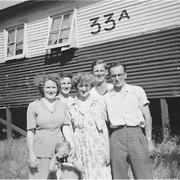
Building 33A used for housing after WW2, courtesy of Peter Dunn's Australia at War.
Details
Camp Pell was an army camp within Royal Park in the suburb of Parkville which, in 1946 became home for around 3,000 people experiencing the post-war housing shortage in Victoria. Many of these families needed temporary accommodation, having been directly affected by 'slum reclamation' policies. Other emergency camps were established at Fawkner Park, Watsonia, South Melbourne and Port Melbourne, but Camp Pell was the most well-known of these. Indeed, Camp Pell and the families who lived there became somewhat notorious and some newspapers even referred to it as 'Camp Hell'. The looming 1956 Melbourne Olympics saw widespread public agitation to close down Camp Pell. Families were often moved on from Camp Pell to public housing developed by the Victorian Housing Commission.
Leonard Tierney's doctoral thesis was about following up with a group of families who had lived in emergency housing at Camp Pell during the post-war period. Tierney described them as 'excluded families' due to these families' difficulties with housing, employment and other social services. Tierney observed that a high proportion of members of the families involved in his research study had been involved with the Social Welfare Department - the family's unstable housing situation often resulting in children being admitted into 'care'.
In 1954, welfare organisation the Brotherhood of St Laurence published a pamphlet, 'What's wrong with Victoria's housing programme?', in which Camp Pell was described as a 'government sponsored slum', and claiming that the families living there were demoralized by the unfair and unsympathetic treatment they received from the government authorities.
Most public representations of Camp Pell were not as sympathetic to the residents. Andrew May writes that '"Camp Hell" was popularly represented in slum stereotypes as a hotbed of immorality and disease'. In 1954, the Liberal opposition campaigned for the closure of Camp Pell. Future Premier Henry Bolte called for the establishment of a 'rehabilitation centre' to train Camp Pell tenants to 'take possession of a home and not turn it into a slum'. The new government elected in 1955 made the closure of Camp Pell a priority, to be effected before the 1956 Melbourne Olympics. In 1956, all of Camp Pell's residents were moved on to public housing estates.
In 2010, former resident Bill described his family's experiences living at Camp Pell during the post-war period:
My Uncle, my Aunt and their nine children were evicted, by a court, from the dump of a house they'd been living in in Oakleigh. They were put into the huts at Camp Pell. Their hut was divided in half with only a thin wall between both ends …
My mother, grandmother, two brothers and I moved to Camp Pell in 1946 and remained there until 1950 when we moved into a West Heidelberg Housing Commission home which we considered palatial.
Three families lived in our army hut - our address was Area 4, Hut 7C. We had an outside bath hut, complete with a chip heater, and there was also a communal wash hut. Inside, the three rooms were tiny. Our room had a double and a single bed with about 20cms between them, and room to only partly open the wardrobe. The sitting area sported a sawdust heater. You'd press in the sawdust, remove the centre rod and fire it up …Sure, there were a few who lifted anything not nailed down - our mate in the next hut used to nick bikes and his dad would repaint them to sell - but most of the inmates were very law abiding citizens who just couldn't find housing.
Many children living at Camp Pell attended the Errol Street State School. Another former resident, Betty, reminisced about her childhood years at Camp Pell:
I lived in Camp Pell as a child and we used to sing a song. I can't remember it all but it started like this: 'Camp Pell kids. Camp Pell kids. Camp Pell kids are we. We're always up to mischief, wherever we may be.' The houses were old army huts and we had a lot of fun.
Sources used to compile this entry: "Close Camp Pell" - Bolte, The Argus, 26 May 1954, 7 pp, http://nla.gov.au/nla.news-article23423829; May, Andrew, 'Camp Pell', in eMelbourne: the city past and present, The University of Melbourne, 2008, http://www.emelbourne.net.au/biogs/EM00284b.htm; Perkin, Steve, 'In Black and White: Topic of the Week: Camp Pell', in Herald Sun, 8 February 2010, http://www.heraldsun.com.au/opinion/editorials/in-black-and-white-topic-of-the-week-camp-pell/story-fn4qercp-1225827917525; Tierney, Leonard James, 'Excluded Families', Leonard Tierney's doctoral thesis was about following up with a group of families who had lived in emergency housing at Camp Pell during the post-war period. Tierney described them as 'excluded families' due to these families' difficulties with housing, employment and other social services. Tierney observed that a high proportion of members of the families involved in his research study had been involved with the Social Welfare Department - the family's unstable housing situation often resulting in children being admitted into 'care'., DSW thesis, Columbia University, 1976.
Prepared by: Cate O'Neill
Created: 21 July 2011, Last modified: 12 February 2015